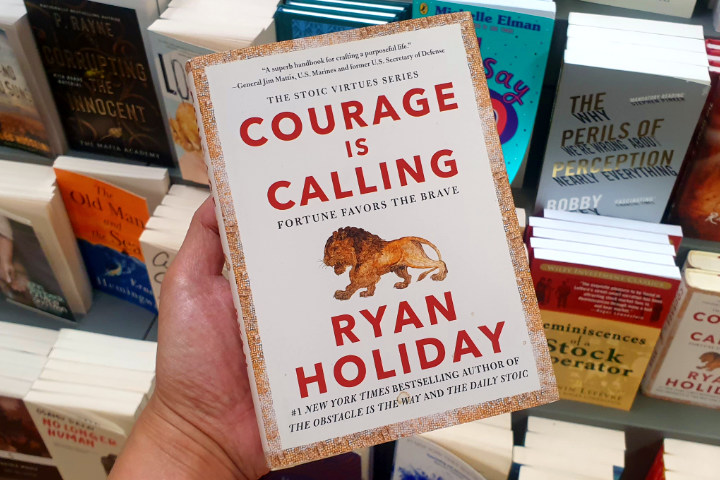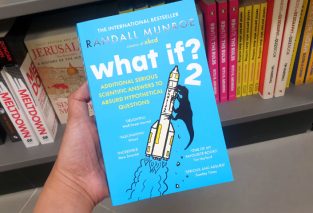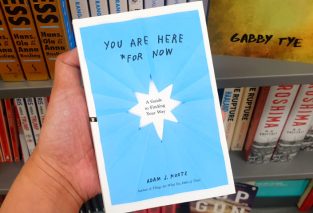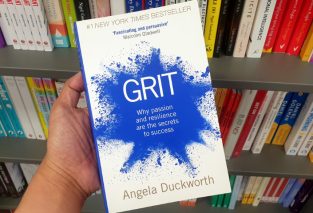Embrace bravery in everyday life by facing fears and challenges. Recognize that courage is essential for personal growth, leading to resilience and the ability to overcome obstacles with confidence.

Ryan Holiday’s Courage is Calling feels like a clarion call for those who find themselves at a crossroads, questioning whether they have the bravery to face what lies ahead.
A rallying cry for those seeking to embrace bravery in the face of life’s challenges.
As the title obviously suggest, the book delves into the theme of courage. Not just as a grandiose act of heroism but as the quiet, everyday decision to choose the path of integrity and principle. Especially when the odds seem overwhelmingly stacked against you.
In true stoic fashion, the author doesn’t simply extol courage as a virtue in an abstract or distant manner. Instead, he redefines it for us, bringing it into the present, the messy, the ordinary.
It’s an unflinching look at the necessity of courage in the life of anyone who wishes to live fully, regardless of their circumstances.
The narrative begins by bringing forth the idea that courage isn’t just a rare quality. Rather, it is a muscle. One that, when exercised consistently, grows stronger.
It unpacks the elements that form the backbone of courage.
The ability to stand firm in one’s beliefs, to endure pain, to defy the conventional and the comfortable, and to act when others hesitate.
But here lies the nuance that sets Courage is Calling apart from the typical “self-help” genre. It doesn’t promise that the path of courage is without cost.
It acknowledges the peril and the vulnerability that come with choosing the difficult path.
There is a realness to Holiday’s depiction of courage, one that reflects both the triumph and the inevitable loss that comes with taking a stand.
After all, as the philosopher Soren Kierkegaard once said,
To dare is to lose one’s footing momentarily. Not to dare is to lose oneself.
What makes this book compelling is it’s adept weaving of historical anecdotes, personal stories, and philosophical reflection.
Illustrating how courage has shaped pivotal moments in history.
Drawing from the lives of revered figures like Frederick Douglass, Rosa Parks, Theodore Roosevelt, and others, readers are invited to not only recognize courage but to see it in action.
These stories serve as a mirror for our own lives, illustrating that courage is often not a single, dramatic moment but a series of small, consistent decisions made in the face of adversity.
Take the story of Eleanor Roosevelt’s transformation. At one point in her life, she was a woman crippled by self-doubt, yet she ultimately became a champion for human rights. It doesn’t make her a mythic figure, but humanizes her struggle. Demonstrating that the courage to stand up for what is right doesn’t arrive all at once. It builds over time.
These tales serve as reminders that courage is not merely an abstract concept but a tangible force that drives action and change. From the battlefield to the boardroom, it shows how acts of bravery have been instrumental in shaping our world, urging readers to heed the call of courage in their own lives.
One of the most thought-provoking aspects of the book is the way the author differentiates between fear and courage.
The former is not something to be eliminated, but something to be understood and ultimately harnessed.
The nature of fear is such that, when confronted, it often reveals its frailty. It is when we are able to look fear squarely in the eye and proceed anyway that we unlock the true potential of courage.
And therein lies one of the more striking insights of the book. Which is that courage is not the absence of fear but the willingness to act despite it.
Courage is not about the absence of fear; it’s about how you respond to it.
This might seem like an obvious point, but in a world obsessed with comfort, certainty, and success, it is crucial to reframe our approach to fear.
The book also has a way of making you ask questions about yourself.
What have I let fear stop me from doing? Where have I been waiting for the “right” moment that never seems to come?
There is an unmistakable challenge that is layed at the feet of readers: Are you willing to rise, despite your doubts?
The moments of indecision that keep us stagnant are often the ones that, if we meet them with courage, could be the very catalyst for a transformed life. So, in many ways, Courage is Calling is an invitation to action. It’s a chance for us to say, “Yes, I will.”
Shortcomings
While the book serves as a roadmap to bravery, there is a slight shortcoming that can’t be ignored.
Even though it is filled with inspiring historical examples, it sometimes falls into the trap of glorifying courage without sufficiently exploring the consequences that can follow an individual’s brave actions.
For instance, the historical figures that Holiday draws on were often able to overcome their struggles, but what about those who took courageous stands but faced ruin as a result?
Take the example of Socrates, who faced death for his philosophical beliefs. His courage didn’t spare him from persecution. The book could have benefited from more attention to the nuances of these outcomes. The often uncomfortable consequences that accompany bold, courageous acts.
Perhaps a deeper dive into how to balance courage with wisdom, or when courage should be tempered by caution, would have enriched the message.
The tendency to lean heavily on historical examples at the expense of more contemporary narratives felt a little overdone. While these stories provide depth and context, a greater emphasis on modern-day acts of bravery could offer readers a more immediate and relevant connection to the material. By showcasing how courage manifests in today’s world, it could further inspire readers to integrate these lessons into their own lives.
This gap doesn’t render the book any less valuable, but it would have made it more holistic.
For example, a more thorough examination of what happens when courage leads to failure or sacrifice. Stories of people whose courage wasn’t rewarded in the traditional sense could serve as a much-needed reminder that, even in the face of defeat, courage remains valuable.
Because sometimes the most courageous thing you can do is to embrace the uncertainty of an outcome and move forward without any promise of success.
And while the book is essentially a champion of courage, it lack in actionable guides on how to cultivate it. Because while The exploration of Stoicism provides a solid foundation for understanding bravery, additional practical exercises or real-world applications could enhance the book’s utility for those looking to take actionable steps towards embracing courage.
Biggest Takeaway
A single thought kept surfacing as I read this masterpiece.
The biggest gift that it gives us is the idea that courage is not a once-in-a-lifetime decision but rather a daily practice.
Every time we do something difficult or uncertain, whether it’s telling the truth in an uncomfortable situation, stepping up to take responsibility when it’s easier to pass the buck, or even deciding to face our own flaws, we are engaging with courage.
It’s a muscle that grows as we put it to use.
So, in that sense, the book doesn’t just preach about courage in the abstract. It provides the blueprint for cultivating it as part of your daily life.
Readers might also come to the realization that courage is not reserved for heroes or extraordinary individuals. It is a quality inherent in all of us, waiting to be awakened. By challenging us to confront our fears and step into our true potential, it empowers us to live more authentically and purposefully.
Ultimately, this book both inspires and instructs, illuminating the timeless virtues of courage that transcend eras and cultures. An invitation to confront fear and uncertainty. Two familiar foes that often paralyze us on the path to fulfillment.
One of the most inspiring aspects of the book is how it encourages the reader to turn courage into a habit. A daily decision to face the difficult truths of our lives and rise above them.
I’d say that the book has succeeded because it dares to ask us to reconsider what it means to be courageous.
By deconstructing the myth of courage as a heroic, almost unattainable virtue, it invites us into a world where courage is present in every quiet, everyday decision.
This is a testament to the human spirit, encouraging us to rise up, regardless of our fears or doubts, and to take action.
If courage were an instrument, this book would be the sheet music for our lives—guiding us not just to play, but to create. So, if I were to take one final jab at courage’s lighter side, I’d say “Courage is calling, and I think it’s time we all pick up”.




